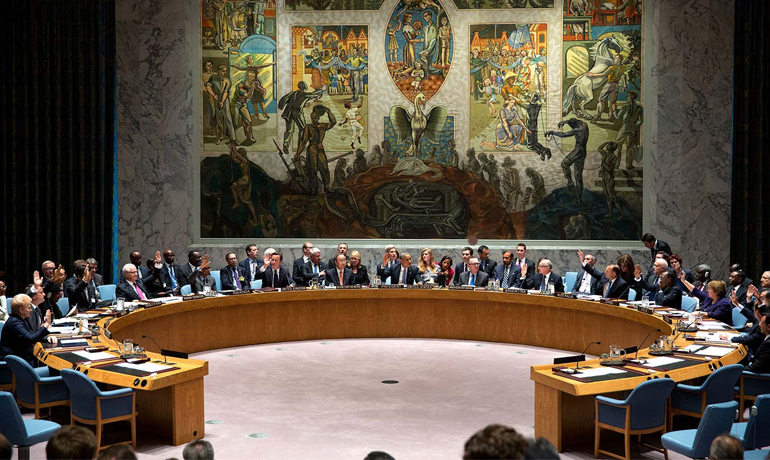This article ventures to assess the deliberate use of all forms of coercion in the GERD negotiations. It also attempts a legality test on each modality of coercion in light of the law of treaty and general international law. Notwithstanding the semantics over the term, coercion can be understood as the act or process of compelling with threats of violence or reprisal or other intimidating behavior by one state over another. This in turn puts a coerced state in fear of potential consequences. The pressure employed might compel a state to act against its sovereign will.
The Vienna Convention on the Law of Treaties (VCLT) is a treaty of treaties that governs the conclusion of multilateral agreements. In spite of its significant role in guiding multilateral treaties, the VCLT has regulated coercion half-heartedly. It is half-hearted on two grounds. First, only a military threat or use is made as grounds for the invalidation of a given treaty. This position unscrupulously made the use of political and economic coercion a legitimate tool to compel a sovereign state to negotiate, or accept a deal unwillingly. Second, VCLT does not warn or alert a coercing state to stop from using military force while the negotiation is pending. Both limitations of the VCLT negate the highest norm of state sovereignty and their freedom of contract. This article will discuss the GERD negotiations and shed light on how international treaty law has fallen short of respect for Ethiopia’s right to state sovereignty and is turning a blind eye to states who are using political, economic, and military coercion in the process of treaty negotiations. Resorting to a holistic reading of the purposes and principles of the United Nations Charter and customary international law would help coerced states, like Ethiopia, to offset the lacuna caused by the treaty.
The Three African Nations Battling Over Ethiopia’s Dam Following Ethiopia’s launch of the GERD, a five billion dollar-hydropower dam on the Blue Nile River, Egypt and Sudan have looked for diplomatic routes to get their concerns addressed. It’s Ethiopia’s sovereign right to determine the filling and operation of its dam, observing existing international laws on transboundary rivers. Unprecedented in the basin and contrary to the exclusionary practices Egypt and Sudan had previously engaged in, Ethiopia has invited the two countries to discuss and negotiate its sovereign dam.
Ethiopia initiated the establishment of the International Panel of Experts (IPOE), consisting of ten experts, tasked with evaluating the design and studying documents of the dam. The panel, in its findings, declared that the design and construction of the GERD was up to international standards and its recommendations were fully accepted by Ethiopia. On 23rd March 2015, the three countries signed the Declaration of Principles (DoP), an instrument intended to facilitate the undertakings of the IPOE’s recommendations.
Among other things, Article 5 of the DoP directs the three nations to cooperate on the first filling and annual operation of the GERD utilizing the recommendations by the IPOE based on the Trilateral National Committee (TNC) findings and to utilize the outcomes of the joint studies. This utilization was in fact conditional on the cooperation of the three nations.
In the DoP, the three nations further “…agree on guidelines and rules on the first filling of GERD which shall cover all different scenarios, in parallel with the construction of GERD…” and also “…agree on guidelines and rules for the annual operation of GERD, which the owner of the dam may adjust from time to time...” The timeline for conducting the above-mentioned process was 15 months from the inception of the two studies recommended by the IPoE.
Egypt’s insistence to employ ‘the existing use’ clause as a baseline scenario for impact assessment resulted in their failure to undertake the joint studies recommended by the TNC. Therefore, Egypt was unable to agree on the guidelines and rules for the first filling and annual operations of the GERD. Following this setback, on May 15, 2018, the National Independent Scientific Research Group (NISRG) was established. The NISRG was tasked with conducting and submitting scientific studies that would inform each party about the first filling and annual operation of the GERD. After conducting four rounds of meetings, the work of the group was interrupted by Egypt’s call on third parties to intervene.
Some of the sticking points in the GERD negotiations are mainly related to filling and refilling of the dam during drought seasons; the implication of a potential agreement for future upstream developments and dispute settlement mechanisms. Egypt and Sudan want Ethiopia to bear the unilateral burden of drought, to release waters from its reservoir and to postpone filling when drought occurs. Ethiopia has strong objections to these demands for two main reasons: to avoid volumetric water share implications jeopardizing Ethiopia’s future use of the Nile waters and for the unjust nature of the request for Ethiopia to solely bear the burden of drought. Ethiopia has called for Egypt and Sudan to utilize the Nile Basin Cooperative Framework Agreement (CFA) to negotiate a water allocation agreement at the basin level. With regard to a dispute settlement process Egypt and Sudan are looking for arbitration, whereas Ethiopia is only opting for a diplomatic solution as already agreed to in the DoP.
Furthermore, Egypt and Sudan are of the opinion that Ethiopia has an obligation, arising from the DoP, not to proceed with the filling of the reservoir before signing a binding deal. Ethiopia whose initiation of the DoP had been in the spirit of goodwill does not agree with additional inferences the two other countries draw from its act of goodwill. Ethiopia has further pointed out that the two countries have exploited its goodwill gesture to infer non-existent political obligations. Ethiopia has repeatedly attempted to conclude the technical discussions that Egypt and Sudan have addressed. Ethiopia has stated that the intransigence of Egypt and Sudan has prevented the full DoP from being implemented, has been carried out in bad faith and that it does not intend to reward these political endgames by delaying the filling of the dam. Nevertheless, Ethiopia completed the first stage filling of the GERD last July and is awaiting the upcoming rainy season to complete the second year of filling despite Egypt and Sudan’s insistence not to proceed without a binding agreement. Since November 2019, the three nations have been engaged in serious and delicate negotiations on the first filling and annual operation of the GERD in the presence of observers.
The Use of Coercion Traced through the Steps of the GERD Negotiations Egypt, Sudan, and third parties involved in the negotiations have used coercion as a negotiation strategy in the tripartite negotiations on ‘the first filling and annual operation of the GERD.’ Despite the unsettled arguments over the aptness of negotiating this unilateral dam project between three nations, coercion (military, economic and political) is purposefully used to compel Ethiopia, the dam owner, to accept a deal without its consent contrary to the UN Charter and general principles of international law. Coercion started after the involvement of the United States and World Bank’s as observers in the negotiation from November 2019. After several rounds of discussions, the observers prepared the draft text that was tabled for signature. Observers were not authorized by the parties to prepare such a draft. Owing to this reason, Ethiopia declined to attend the last meeting held in Washington DC. It did so by sending a prior request, to the observers, for the postponement of the meeting to discuss with national stakeholders. Regardless of this notification, however, Egypt and Sudan held the meeting with the United States and the World Bank without Ethiopia’s attendance.
Following Ethiopia’s absence from the last meeting, the U.S. Department of the Treasury released a statement, whose central message reads “final testing and filling should not take place without an agreement.” It further states “The United States reaffirms its commitment to remain engaged with the three countries until they sign the final agreement.” Ethiopia, in reaction to the US Department of Treasury’s statement, replied that “The “text” reportedly initiated by the Arab Republic of Egypt in Washington D.C. is not the outcome of the negotiation or the technical and legal discussion of the three countries.” This unveils how the U.S. attempted to impose a deal against the will of one of the negotiating states in support of the others.
As negotiation was paused for a while, Egypt and Sudan made an application to the United Nations Security Council (UNSC) by invoking Article 35 of the United Nations charter and accused Ethiopia of not accepting the Washington deal. Without this deal, the applicants submit, the GERD poses a threat to international peace and security. In their submission, Egypt and Sudan urged the UNSC to press Ethiopia to accept and sign the Washington deal that Ethiopia had rejected. The UNSC, after hearing the concerns of the three states, advised the parties to settle their differences through already established channels, namely the African Union led negotiation.
Ethiopia, in its June 22, 2020 response to Egypt’s UNSC letter, has asserted that “If there is, in fact, any threat to peace and security in connection with the GERD the responsible party would be Egypt, which has been engaged in saber-rattling and bellicose threats to use force.” Ethiopia has accused Egypt of negotiating in bad faith and exerting undue pressure against Ethiopia. For that reason, Ethiopia has added the following in its reply “…But if the negotiations are discontinued because Egypt wants to secure its maximalist demands by exerting political and diplomatic pressure, there is no reason why Ethiopia should take the blame for that.” [Emphasis added] Such official assertions from Ethiopia coupled with the incitement for war made by President Trump and the cutting of aid as a reprisal for Ethiopia’s unwillingness to accept the Washington deal unveils the existence of all forms of coercion in the GERD negotiations. Unfortunately, the legal body that could have regulated such instances has failed to put a procedural remedy for coercion to be invoked by the negotiating parties. VCLT simply puts forward a post-negotiation remedy that makes a treaty concluded through the threat or use of force null and void. But for the writer, VCLT has ignored the vitality of invoking coercion, all forms for that matter, in the process of negotiation. An after-the-fact remedy of invalidation on the ground of coercion is unhelpful.
Regardless of the coercion, Ethiopia has remained firm in its position not to accept draft deals and continued with the GERD negotiations mediated by the African Union and the European Union in the observer’s list. Since the three countries did not reach an agreement due to the political impositions on the few remaining technical details, Ethiopia implemented the first phase filling of the dam and impounded around 4.9 BCM. In retaliation to Ethiopia’s first phase filling of first stage-filling, the United States withheld some 130 million dollars of development aid. Once he knew the inability of reaching agreements between the three nations, President Donald Trump also made an aggressive statement “They [Egypt] will end up blowing up the dam. And I said it and I say it loud and clear — they’ll blow up that dam. And they have to do something,” Trump continued, “I had a deal done for them, and then, unfortunately, Ethiopia broke the deal, which they should not have done. That was a big mistake. They will never see that money unless they adhere to that agreement.” By a deal, he was referring to the draft agreement prepared by the U.S. Treasury and World Bank which was rejected by Ethiopia. This statement from a president of the U.S is an incitement to war between the disputing countries. This reveals U.S. attempts to put its fingers on the scale to impose a deal against the will of the negotiating state, Ethiopia.
Though President Trump left office by January 2021, the GERD negotiations have continued under the facilitation of the African Union along with other observers. In addition to these bad faith political maneuverings, Egypt and Sudan have been sending dire warnings by holding military exercises. Sudan has been amassing troops on Ethiopia’s borders and making incursions into Ethiopian territory and at the same time urging Ethiopia not to fill the second phase without concluding a binding legal agreement. Egypt and Sudan further requested for negotiations to take place before a quartet of the African Union, the European Union, the United Nations, and the United States by increasing the third parties’ role beyond their current observer and facilitator role. Ethiopia has refused this proposal, as it trusts that the negotiation under the current format would yield a solution if undertaken in good faith. Negotiation under the current format is yet to resume. Egypt and Sudan lack the political will to allow their technical teams to fulfill their obligations under the DoP. Their skewed interpretation of the DoP makes them believe that their intransigence and delays, to date, will be rewarded. Threats from both parties remain constant and ever present. Egypt has continued to try and exert its influence on Ethiopia’s internal politics by arming rebel groups as it has done for decades past. It also sought to enter into military alliances with Ethiopia’s neighbors and to create supply and logistics bases to make Ethiopia’s government believe it is under imminent military threat. Ethiopia’s self-restraint to Sudan’s border incursions and to Egypt’s meddling in its internal affairs, have been matched by the resolve of its people and government both to self-fund and complete the GERD and preparing it before the heavy Ethiopian winter rains commence. The benefits the GERD provides to Egypt and mostly to Sudan in the flow regulation and flood mitigation is incalculable. Sudan has been suffering severe floods practically every year in all it’s regions. The GERD would reduce the occurrences of these floods and make water evenly available for its use throughout the year. Both Egypt and Sudan would benefit from the significant problems posed by silt buildup in their own dams. All this courtesy of the Ethiopian people, who were denied international funding for decades due to Egyptian influence provided most of the five billion dollars for the dam themselves. Still, Egypt and Sudan have expressed concern not for the existential drought they both first claimed, but for Ethiopia’s control of the Nile River. Presumably, a binding agreement would give them control over the dam. Given such impasses and ambivalence, it is unlikely the negotiation would culminate in a deal.
Statements were made by the United States Treasury Department that Ethiopia should not undertake final testing and filling without prior authorization of the negotiating parties. The United States was prepared to withhold development aid as a form of reprisal. and saw it fit to escalate the dispute and treat it as a threat to international peace and security that should be addressed by the United Nations Security Council. This also prompted the US President to make comments about “blowing-up” the dam and later a joint military pact and two military exercises between Egypt and Sudan. All of these are blatant political, economic, and military forms of coercion purposefully used in the trilateral negotiations. The purpose of these actions are to force Ethiopia to accept a deal without its consent. It should however be noted that the Biden Administration has delinked the aid budget from the dam politics and introduced it in another political area.
The VCLT Overlooks the use of Coercion in the Process of Negotiations Ethiopia, the dam owner, is under unrelenting military, economic, and political coercion from Egypt, Sudan and their allies in the negotiations. The VCLT, a treaty of treaties, has flaws. It’s stand on coercion is one of its constant failings. It’s other failing is its non-recognition of economic and political coercion as a ground of treaty invalidation. Unlike the threat or use of force and its dormant role to halt military coercion while negotiations are pending are the major shortcomings of Article 52 of the VCLT. The GERD negotiations between Ethiopia, Egypt, and Sudan demonstrates how the defects in the VCLT have a boomerang effect. While the three countries have been in tread-water negotiations for about a decade, coercion has unscrupulously been used as a negotiating strategy in the process. For this, the VCLT should take the blame as it fails to prohibit states from using coercion as a tool for negotiation. Its approach to declare a treaty void if concluded in bad faith or through the threat or use of force is useless as it is unhelpful to quell illegality before it turns into a result. It should have designed a mechanism to quit a process as soon as bad faith or coercion is detected as a means to an end in the negotiation.
Also, the VCLT should have included all forms of coercion as was recommended by states from the Global South during the negotiation and deliberation of the VCLT. Looking at the perspectives of third world nations, non-military forms of coercion might have compelled them to accept unfair deals for fear of the consequences. The interpretative declaration made by the Syrian Arab Republic during its accession to the VCLT supports this article’s definition of coercion. Its declaration reads as “The expression ‘the threat or use of force’ used in this article [Article 52] extends also to the employment of economic, political, military and psychological coercion and to all types of coercion constraining a State to conclude a treaty against its wishes or its interests.” The “wait and see” approach, which the VCLT adopts, has indirectly encouraged the violation of international law. It might also stimulate tension between negotiating states whose treaty would render no effect subsequent to its conclusion through coercion. The failure to include political and economic pressures in the definition of coercion implies that powerful and wealthy countries are allowed to use them as tools to coerce weak states to accept a deal fearing political and economic consequences. This fact was foretold in the negotiation of the VCLT as some 19 states proposed to include political and economic pressures in the definition of coercion. The Silent Evil Acts of VCLT Should be rectified The VCLT does not offer an entry-point that would allow Ethiopia to raise its legitimate concerns as a matter of the international law of treaties. The only solution VCLT provides is to wait until the process bears fruit and then claim invalidity. What degenerates the situation in light with the VCLT is the fact that invalidation is possible only on the ground of military coercion, as political and economic coercion are excluded from the definition carved in Article 52 of the VCLT. “A treaty is void if its conclusion has been procured by the threat or use of force in violation of the principles of international law embodied in the Charter of the United Nations.” By rejecting this proposal, the United Nations Conference on the Law of Treaties adopted ‘the Declaration on the Prohibition of Military, Political or Economic Coercion in the Conclusion of Treaties‘. This instrument ‘solemnly condemns the threat or use of pressure in any form, whether military, political, or economic, by any State, in order to coerce another State to perform any act relating to the conclusion of a treaty in violation of the principles of the sovereign equality of States and freedom of consent.’ Shifting the proposal from the inclusion in the VCLT to another soft instrument is an indication of the hegemonic foundation of international law. Had it not been the case, political and economic pressures would have also been prohibited by the VCLT as proposed by the states from the Global South. That failure has opened the room for the unrestricted employment of economic and political coercion in the process of treaty negotiations. The strategies employed in the GERD negotiations affirm such manipulations.Hence, the GERD negotiation serves as a reminder to the international community to find a way to regulate political and economic pressures for the purpose of treaty negotiations. Any move to rectify these gaps should also consider the ‘when to invoke coercion’ question. Nevertheless, the gaps in VCLT do not preclude states to withdraw from a negotiation propelled by coercion. Especially for the threat or use of force version of coercion. They can withdraw from negotiations by invoking Article 2(4) of the UN Charter without waiting for the conclusion of a void treaty. But the public should know that any deal earned from this coercive negotiation will not be enforced against Ethiopia as its conclusions would be done in violation of the touchstone of international law, the prohibition of threat or use of force, a principle that has attained jus cogens norm of customary international law in which every state has an erga omnes obligation to pay a respect for. The coercing states participating in the GERD negotiation would finally bear an international state responsibility for their fundamental breach of international legal obligations arising from the UN Charter and customary international law.
The opinions expressed within this article are solely the author’s and do not reflect the opinions and beliefs of WeAspire or its affiliates.

Dejen Yemane Messele
Dejen Yemane Messele is a Lecturer in the School of Law, Wollo University, Ethiopia. He writes and advocates for a critical and prudent use of water diplomacy for the politics of the Abay (Nile River).



